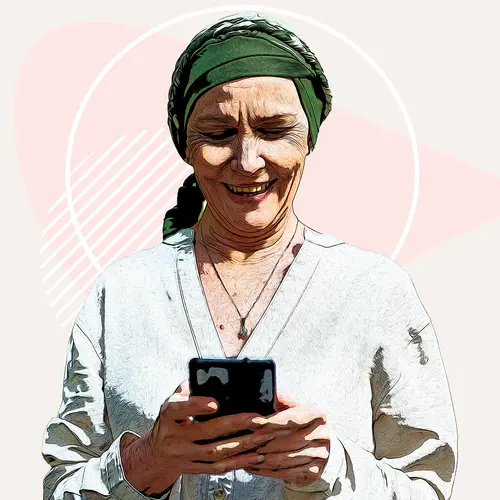By Heather Cruz, RN, as told to Stephanie Watson
My patients are definitely the best part of my job as an oncology nurse. I get to see them from the time of diagnosis to the end of life. They become like family.
I've been an oncology nurse for 22 years, and in that time I've seen people face a lot of challenges -- some they were prepared for, and some they weren't. Although they have access to a lot more information now, they still come in with some wrong ideas about their cancer and its treatment.
It's Not a Fight, It's a Journey
A lot of times when people come in, with advanced breast cancer in particular, they're used to hearing the narrative of the "fight against cancer" in the media and from their friends.
That might be OK for someone with an early-stage cancer who will get a finite series of treatments and then come through to the other side. But when you have metastatic cancer, there is no winning the fight. You have to manage cancer like a chronic disease and pace yourself.
That's a very hard switch for people, especially if they were first diagnosed with an early-stage cancer, they finished treatment, and then their cancer came back. People get overwhelmed. They're scared and they're tired. Sometimes they just don't have the fight in them.
Part of the conversation we have is putting the "fight" talk aside. Instead, we talk about living with cancer and managing it.
You May Not Get the Latest Cutting-Edge Treatment
A lot of people come in wanting to be on the latest new therapy, which could be an immunotherapy or other cutting-edge treatment they've heard about on the news.
But the frontline treatments for breast cancer are the standard therapies we've been using for a long time. That's because we know they work.
Treatment Isn't as Toxic as You Think
With advanced breast cancer, a lot of the time we're giving hormonal therapy rather than chemotherapy. But where chemotherapy is concerned, patients hear so many stories that they're always expecting the very worst. It's like pregnancy. You don't hear about the normal births. You hear the horror stories.
Chemotherapy has a bad reputation for a good reason. It's toxic. But we know the problems it causes, and we can manage them. Nausea, diarrhea, mouth sores, and other symptoms can all be controlled. Even hair loss can be lessened.
Make sure you tell your treatment team about your symptoms, too. It‘ll make all the difference in how you feel. As a nurse, I see my job as being a symptom manager. I always encourage my patients to call me if they have any symptoms from their treatment.
Everyone's Situation Is Different
People are much more educated now, in part because they have the ability to Google. Unfortunately, Google has lots of rabbit holes to go down. Online chats can be particularly unhelpful. First of all, people are talking about their own experiences, which may be entirely different from yours. And folks who post online tend to lean toward the dramatic.
Even support groups can be challenging. For example, you could be in a group with people in different stages of breast cancer. Some may be finishing their treatment while you're on lifelong treatment. That can be difficult.
If you get into an advanced breast cancer support group, some of the people around you might die. That can be very upsetting. Choose your support group carefully. If you want to know what outcome you can expect, ask the members of your medical team.
The Cost of Treatment Can Blindside You
The new specialty breast cancer drugs can be insanely expensive. And until you get sick, you may not know what your insurance will cover. A lot of people think they have great coverage, only to discover it isn’t as good as they thought.
I have one patient in her 70s with advanced breast cancer. She's always lived a very full life and traveled all over the world. But when her disease progressed she was prescribed an additional medication. Her co-pay was almost $2,000 for a month's supply. She’s retired, and her treatment took away her ability to travel -- the thing she loved doing most.
The financial drain of treatment is something that affects a lot of people. It limits their ability to live life to the fullest. We work to get their drugs covered through prior approval and assistance from the pharmaceutical companies, but it breaks my heart that so many people are stressed about the cost of their treatment instead of looking after themselves and trying to get well.
You Will Need Support
Even someone who’s been living with breast cancer for many years and has come to terms with it will have their moments. It may be when they come in for their follow-up appointments and the enormity of their disease comes flooding back.
Cancer centers like ours offer social workers and counselors. Don't wait until your next visit if you feel like you need to speak to someone. Social workers are also excellent at framing the conversations you'll need to have about your cancer with your children and other family members.
Do What Brings You Joy
Living with cancer can be frustrating and stressful. People who have it are often told they're not allowed to be angry, that they have to stay positive. It's OK to express your frustration. If you can't express it to your family, talk to a therapist. There's something very freeing about being able to say what's on your mind without fear of judgment or of upsetting anybody.
I also think it's really important to find what gives you joy. Talk to friends. Take walks. Find things that will help you relax, like acupuncture or massage. Those kinds of things can be great de-stressors.

